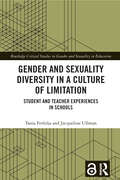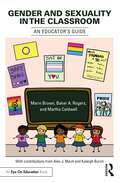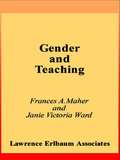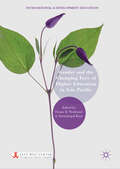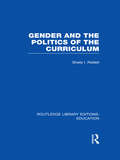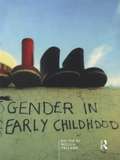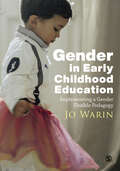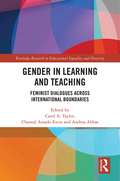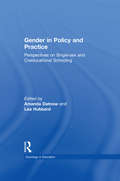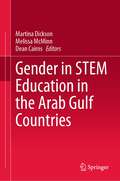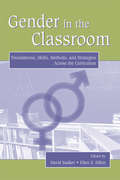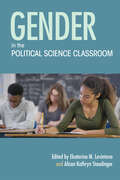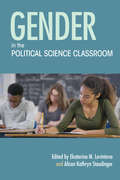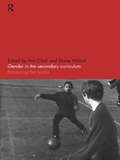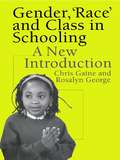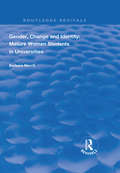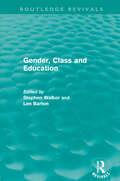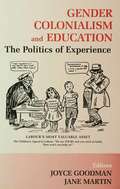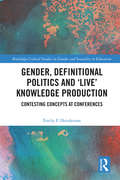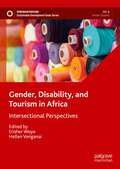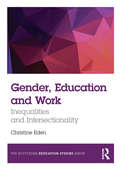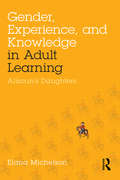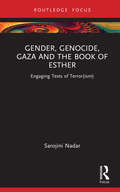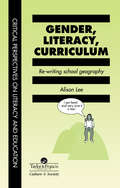- Table View
- List View
Gender and Sexuality Diversity in a Culture of Limitation: Student and Teacher Experiences in Schools (Routledge Critical Studies in Gender and Sexuality in Education)
by Jacqueline Ullman Tania FerfoljaGender and Sexuality Diversity in a Culture of Limitation provides an outstanding and insightful critique of the ways that contemporary education is impacted by a range of political, social and cultural influences that inform the approaches that schools take in relation to gender and sexuality diversity. By applying feminist poststructural and Foucauldian frameworks, the book examines the ongoing impact of broader socio-cultural discourse on the lives of gender and sexuality diverse students and teachers. Beginning with an overview of the impact of how a culture of limitation is realised in Australia, the focus moves beyond this context to examine state and federal policies from comparable societies in countries including the USA and the UK and their effect on the production of knowledges and what’s permissible to include in educational curriculum. This research-driven book thus provides a comparative, international overview of the current state of gender and sexuality diversity in schools, and convincingly demonstrates that despite some empowerment of gender and sexuality diverse individuals, silencing and marginalization remain powerful forces. This book will be of great interest to graduate and postgraduate students, academics, professionals, and policy makers interested in the field of gender and sexuality in education. It is essential reading for those involved in pre-service and in-service teacher education, diversity education, the sociology of education, as well as education more generally.
Gender and Sexuality in the Classroom: An Educator's Guide
by Martha Caldwell Baker A. Rogers Marni BrownCreate a more gender-inclusive climate in your classroom and school. This important book breaks down issues of gender and sexuality at the individual, interactional, and institutional level and shows how you can cultivate an atmosphere of acceptance and belonging for all students. You’ll learn key concepts and terms educators need to know to support students, how gender and sexuality identities develop and influence mental health, why we should take an intersectional approach with students, and the importance of creating psychological safety in the classroom. You’ll also gain practical suggestions on how to disrupt unconscious bias, represent diverse voices, counteract microaggressions, use gender-neutral language and preferred pronouns, address gender bullying, provide safe zones, and craft inclusive school statements. Each chapter contains examples, anecdotes from teachers and students, best practices, and resources to help you along the way. Appropriate for educators of all grade levels, this book’s clear, helpful advice will help you ensure that your students feel visible, affirmed, and safe, so they can thrive in school and beyond.
Gender and Teaching
by Frances A. Maher Janie Victoria WardGender and Teaching provides a vivid, focused, and interactive overview of the important gender issues in education today. This is accomplished through conversations among experts, practitioners, and readers that are informed by representative case studies and by a range of theoretical approaches to the issues. Gender and Teaching is the third volume in the "Reflective Teaching and the Social Conditions of Schooling" series edited by Daniel P. Liston and Kenneth M. Zeichner. It follows the same format as previous volumes in the series. Part I includes four cases dealing with related aspects of gendered experiences in schools (nonsexist elementary school curricula, gender and race implications of special education assignment practices, homophobia in high schools and classrooms, and teaching as a woman's profession), followed by a set of teachers', administrators', and professors' reactions to each case. Part II is an elaboration of four "public arguments"--conservative, liberal, women-centered, and radical multicultural--pertaining to the issues raised in the cases in Part I. These arguments exemplify clusters of orientations, organized around general values rather than hard and fast principles. Part III presents the authors' own interpretations of the issues raised throughout the work and provides activities and topics for reflection and an annotated bibliography of additional resources. Content and Pedagogical Features: *Readers are encouraged throughout to interact with the text. They can respond to each case and compare their responses to those of others in the field. *The cases and discussions that follow help students begin to evolve their own "practical theories"; explore and perhaps modify some of their basic beliefs and assumptions; become acquainted with other points of view; and look further into the connections and intersections of gender with other structural dynamics and practices--those of race, class, and culture--as intrinsic to their explorations into the social conditions of schooling. *The major strands in feminist theory about women and education are presented so that students can analyze the differences among them, come up with positions of their own, and learn to defend them. *Although the authors draw on historical and sociological frameworks that show how women have historically been discriminated against in our schools and in our society, their goal is an education that is equally fair to everyone, boys as well as girls. Gender and Teaching is pertinent for all prospective and practicing teachers at any stage of their training. It can be used in any undergraduate or graduate course that addresses issues of gender and teaching.
Gender and the Changing Face of Higher Education in Asia Pacific (International and Development Education)
by Deane E. Neubauer Surinderpal KaurThis book establishes gender issues as a major focus within developments shaping higher education in the Asia Pacific region. The discussion is framed as a response to various dedicated efforts, such as that of the United Nations, to foreground gender as a site for political discourse throughout the region. Throughout the volume, authors confront issues that continue to gain prominence in higher education as a policy arena, including the degree to which higher education operates within a framework of gender equity and how higher education appointments—even promotions—are sensitive to gender. By touching specific instances throughout Korea, Japan, China, Australia, India, Malaysia, Thailand, and Taiwan, authors offer an unprecedented big-picture view of gender-relevant policy issues.
Gender and the Politics of the Curriculum (Routledge Library Editions: Education)
by Sheila RiddellThis book uses detailed case studies of two secondary schools to examine the relationship between curriculum choice and gender identity among fourteen-year-old pupils making their first choices about what subjects to pursue at exam level. It reveals a two way process. Pupils’ decisions on what subject to take are influenced by how they perceive themselves in gender terms, and the curriculum once chosen reinforces their sense of gender divisions. The author looks at the influences on pupils at this stage in their lives from peers, family and the labour market as well as from teachers. She argues that the belief in freedom of choice and school neutrality espoused by many teachers can become an important factor in the reproduction of gender divisions, and that unless the introduction of the national curriculum is accompanied by systematic efforts to eradicate sexism from the hidden curriculum it will fail in its aim of creating greater equality of educational opportunity among the sexes.
Gender in Early Childhood
by Nicola YellandThis book will explore the ways in which young children perceive themselves and are viewed by others in terms of their gendered identities as individuals and as members of society. It considers research from a variety of perspectives in the context of home/family and school. Topics covered include:* the construction of gender from the time the child is conceived* the politics of category membership* analyses of play and art making* young children's experiences with technology* the influence of popular culture on the body image* gender equity policies in early childhood education* understanding sexual orientation.An examination and reflection of the issues will enable educators to improve their practice and have a greater understanding of the families and the children whom they teach. The diverse range and content of the research will make this book a valuable resource for all those interested in the education of young children. This book covers the issue of gender expectations of children with disabilities, and also discusses young childrens' experiences with technology and the ways in which they feel about their bodies.This book will be of great interest to all early childhood educators who are concerned about the ways in which the home and school impact on the lives of young children in terms of how they view themselves and how others view them. Trainee teachers will find this book helpful in developing their own attitudes, understandings and behaviours in relation to gender equity and young children.
Gender in Early Childhood Education: Implementing a Gender Flexible Pedagogy
by Jo WarinThis book is an essential resource for exploring and deconstructing the gender binary in the early years sector. Drawing on Warin’s extensive research, it offers practical advice, examples of innovative classroom practice, and thought-provoking case studies, balanced alongside lively debate, scholarly discussion, and questions for reader reflection. The book not only covers the existing debates in the field, but proposes and advocates for a ′gender flexible′ approach to the teaching and learning of young children that challenges gender stereotypes and essentialism. The style and content bridge the gap between theory and practice making it perfect for an audience of early years education students, professionals, trainees and researchers. Jo Warin is Professor in Gender and Social Relationships in Education at Lancaster University
Gender in Early Childhood Education: Implementing a Gender Flexible Pedagogy
by Jo WarinThis book is an essential resource for exploring and deconstructing the gender binary in the early years sector. Drawing on Warin’s extensive research, it offers practical advice, examples of innovative classroom practice, and thought-provoking case studies, balanced alongside lively debate, scholarly discussion, and questions for reader reflection. The book not only covers the existing debates in the field, but proposes and advocates for a ′gender flexible′ approach to the teaching and learning of young children that challenges gender stereotypes and essentialism. The style and content bridge the gap between theory and practice making it perfect for an audience of early years education students, professionals, trainees and researchers. Jo Warin is Professor in Gender and Social Relationships in Education at Lancaster University
Gender in Learning and Teaching: Feminist Dialogues Across International Boundaries (Routledge Research in Educational Equality and Diversity)
by Andrea Abbas Carol A. Taylor Chantal Amade-EscotGender in Learning and Teaching brings together leading gender and feminist scholars to provide a unique collection of international research into learning and teaching. Through dialogues across national traditions and boundaries, the authors provide new insights into the relations between feminist scholarship of pedagogy, gender and didactics, and offer in-depth accounts that critically investigate how gender relations are enacted, contested and analysed at the level of the classroom, the curriculum, and the institution. Drawing on original research, the chapters explore gender dynamics in relation to student-teacher interactions, gendered classroom practices, curriculum content and knowledge formation in different subjects. The book includes accounts of innovative approaches to curriculum development to address gender inequality. It includes new theoretical frameworks and methodological approaches which provide fresh insights into gendered practices including intersectionality, new material feminism, epistemic gender positioning and cultural anthropology. The chapters span all education phases from early years to higher education. This book makes a compelling case for the continuing relevance of feminist pedagogy and the urgent need for strategies to address gender inequalities in the classroom and beyond. It will be of great interest to academics and postgraduate students in the fields of theory, philosophy and feminist politics of learning and teaching; education and didactics; feminism and pedagogy; sociology and the arts.
Gender in Policy and Practice: Perspectives on Single Sex and Coeducational Schooling (Sociology in Education)
by Lea Hubbard Amanda DatnowThis book exposes the complexity of single-sex schooling, and sheds new light on how gender operates in policy and practice in education. The essays collected in this volume cover a wide range of institutions, including K-12 and higher education, public and private schools, and schools in the US and beyond. Detailing the educational experiences of both young men and women, this collection examines how schooling shapes-and is shaped by- the social construction of gender in history and in contemporary society.
Gender in STEM Education in the Arab Gulf Countries
by Martina Dickson Melissa McMinn Dean CairnsThis book explores the critical issues in gender and STEM education in the Arabian Gulf, written within a context of educational systems developing rapidly over recent decades. With the ever-growing need for a highly skilled, gender-inclusive STEM workforce, the issues raised in this book are more topical than ever. It presents chapters from various sectors such as children’s perceptions of science, scientists and their work, adolescent and university years by studying large-scale secondary data variations across countries in the region and finally presenting work relating to gender in STEM education. The book closes with a chapter on factors of success in female leaders’ STEM career journeys. It offers recommendations for both policy and practices in gender equity in the STEM workplace, based on their experiences. This book is written in a highly accessible yet academic manner. It is an essential resource for a wide-ranging audience interested in the complex relationships between gender and STEM.
Gender in the Classroom: Foundations, Skills, Methods, and Strategies Across the Curriculum
by David Sadker Ellen S. SilberWhat’s missing from your teacher education program? According to research studies, one glaring omission is gender. Tomorrow’s teachers receive little instruction or training on the tremendous impact of gender in the classroom. Just how does gender influence teaching, the curriculum, and the lives of teachers and students in the classroom? This unique book has been designed to answer these questions. Gender in the Classroom is intended to be used across the teacher education curriculum--from subject-specific methods courses to foundations, from educational psychology to student teaching. It can be adopted for an entire program, or several instructors can adopt it jointly, or a single instructor can adopt it as one of several or a supplementary text for a course. A comprehensive Instructor’s Manual provides information and materials for teacher educators who adopt the text. Each chapter offers practical information and skills about gender and sex differences, curriculum, and specific teaching methods. Written in a lively style, the text features a number of interactive activities to engage and instruct the reader. The chapters follow a common format designed to invite student interest and action. Each is built around Essential Equity Questions that focus on pertinent gender-related questions and issues in a specific subject area:*the role of women in education--intersections of the teaching profession, feminism, and teachers as activists for social change; *gender differences in cognitive ability, attitudes, and behavior;*how to teach and implement Title IX;*how to observe classrooms to “see” gender bias;*social studies education; *English/language arts methods; *science education; and*mathematics and technology education. Interactions in each chapter engage students in activities to promote understanding. Each Interaction is linked to one or more specific INTASC standards. In the last chapter, the emphasis is on applying many of the skills learned previously--it gives student teachers and their supervisors several tools they can use for analyzing classroom teaching and detecting gender bias. This chapter also includes a culminating activity for identifying and correcting curricular bias. In fact, many of the techniques in this text can be applied to uncover and correct not only gender bias, but racial, ethnic, and cultural bias as well. The Instructor's Manual [978-0-8058-5475-6] is now available electronically (please contact our customer service department to request a copy).
Gender in the Political Science Classroom (Scholarship Of Teaching And Learning Ser.)
by Ekaterina M. Levintova Alison Kathryn StaudingerA collection of studies examining the role of gender in teaching and learning in the traditionally male-dominated field of political science.Gender in the Political Science Classroom looks at the roles gender plays in teaching and learning in the traditionally male-dominated field of political science. The contributors to this collection bring a new perspective to investigations of gender issues in the political behavior literature and feminist pedagogy by uniting them with the Scholarship of Teaching and Learning (SoTL). The volume offers a balance between the theoretical and the practical, and includes discussions of issues such as curriculum, class participation, service learning, doctoral dissertations, and professional placements. The contributors reveal the discipline of political science as a source of continuing gender-based inequities, but also as a potential site for transformative pedagogy and partnerships that are mindful of gender. While the contributors focus on the discipline of political science, their findings about gender in higher education are relevant to SoTL practitioners, other social-science disciplines, and the academy at large.“A bold and compelling collection that asks important questions about the ways in which the teaching of Political Science reproduces gender inequities.” —Aeron Haynie
Gender in the Political Science Classroom (Scholarship of Teaching and Learning)
by Ekaterina M. Levintova Alison Kathryn StaudingerGender in the Political Science Classroom looks at the roles gender plays in teaching and learning in the traditionally male-dominated field of political science. The contributors to this collection bring a new perspective to investigations of gender issues in the political behavior literature and feminist pedagogy by uniting them with the Scholarship of Teaching and Learning (SoTL). The volume offers a balance between the theoretical and the practical, and includes discussions of issues such as curriculum, class participation, service learning, doctoral dissertations, and professional placements. The contributors reveal the discipline of political science as a source of continuing gender-based inequities, but also as a potential site for transformative pedagogy and partnerships that are mindful of gender. While the contributors focus on the discipline of political science, their findings about gender in higher education are relevant to SoTL practitioners, other social-science disciplines, and the academy at large.
Gender in the Secondary Curriculum: Balancing the Books
by Elaine Millard Ann ClarkThe 'gender gap' in GCSE results continues to be of prime concern, and there is now a real need for knowledge about how teachers can address this gap. In this volume, a team of contributors considers the gender issues particular to each subject of the secondary curriculum. They discuss effective strategies supported by their research and practice, and offer some ways forward for teachers. The book begins with an overview of contemporary social and cultural approaches to schooling and gender, focusing particularly on the contribution of feminist scholars to the debate. It further examines key aspects of the secondary school curriculum and the implications for learners of their gendered identity. The final section moves beyond the classroom to discuss the influence of current theoretical perspectives on the complex inter-relationship between the curriculum and young peoples' gendered identities, and its implications for their future development. In discussing the character of boys' and girls' achievements in a range of school subjects, the authors seek to 'balance the books' by debating the different, if sometimes competing needs of both boys and girls.
Gender, 'Race' and Class in Schooling: A New Introduction
by Chris Gaine Rosalyn George Dr Chris Gaine Ms Rosalyn GeorgeWith education and social inequalities under scrutiny, this timely book provides an up-to-date summary of research into the key issues, as well as practical strategies for educators, including strategies for staff development, working with children and school policy. The facts have changed significantly, and much received wisdom cannot be relied upon: girls' performance is rising faster than boys and surpasses them in almost all respects up to the age of 18; unequal opportunity faced by those of different race is becoming more fractured along class, gender, ethnic and religious lines; class divisions are increased with the reintroduction of selection and has become a matter of concern for government and school policy makers. This title makes good the lack of literature on inequality, and brings teachers, and those training to be teachers, the latest information.
Gender, Change and Identity: Mature Women Students in Universities (Routledge Revivals)
by Barbara MerrillFirst published in 1999, this volume centres on a case study which looks at the experiences of non-traditional adult women students in universities, from the perspective of the actors. The interaction of structure and agency and the significance of macro and micro levels in shaping the behaviour, attitudes and experiences of women adult students are examined by drawing on three perspectives: feminism, Marxism and interactionism. An underlying question is to what extent did studying change the way participants perceived themselves as women? It relates life histories to their student career as individuals and collectively as subcultural groups. It also breaks new ground by including a sample of male adult students in order to compare and clarify gender issues. It also uses macro and micro sociological theories as a tool for understanding the experiences of women at university and the relationship between their public and private lives. The book concludes that studying for a degree represented an active decision to take greater control, to break free from gender and class restraints, and to transform individual lives. The study aims to clarify and reassert the radical individual traditions within sociology, feminism and adult education.
Gender, Class and Education (Routledge Revivals)
by Stephen Walker Len BartonFirst published in 1983, Gender, Class and Education is a collection of papers that formed presentations at the Westhill Sociology of Education Conference in January 1982, and is the fifth such collection to emerge from the annual conference. The conference theme, ‘Race, Class and Gender’, was not only chosen because of its topicality, but also to provide a framework for debate between educational researchers and teachers. The papers focus on the reproduction of gender relations through education and provide important insights into how this process works, how it is resisted in schools and colleges, and the possibilities for radical intervention. This volume includes three teaching bibliographies on gender and education which were not presented at the conference, but were compiled specially for the book.
Gender, Colonialism and Education: An International Perspective (Woburn Education Series)
by Jane Martin Joyce GoodmanAn examination of the ways in which gender intersects with informal and formal education in England, Germany, Indonesia, South Africa, USA and the Netherlands. The book looks at various issues including: citizenship; authority; colonialism and education; and the construction of national identities.
Gender, Definitional Politics and 'Live' Knowledge Production: Contesting Concepts at Conferences (Routledge Critical Studies in Gender and Sexuality in Education)
by Emily F. HendersonWaking up to the reactivity of concepts, to their myriad possibilities for signification, to the range and strength of affective responses they provoke, can happen at any time, in any place. Conceptual contestations shake up the comfortably consolidated foundations of sociological knowledge production, but they also have consequences for the ways in which lives are understood, researched and legislated for. This book is dedicated to exploring the definitional politics which surround the concept of gender in ‘live’ knowledge production. While conferences remain an under-researched phenomenon, this volume places conference knowledge production under the spotlight; conferences, in particular national women’s studies association conferences in the UK, the US and India, are explored as sites where definitional politics play out. The cumulative theorisation of ‘live’ conceptual knowledge production that is developed throughout the book draws on established constructs such as performativity, citationality, intersectionality, materiality and events, but works with them in combination in a new, unique way. The book as a whole calls for more attention to be paid to conceptual knowledge production, so as to make more space for potentially transformative conceptual change.
Gender, Disability, and Tourism in Africa: Intersectional Perspectives (Sustainable Development Goals Series)
by Erisher Woyo Hellen VenganaiThis book explores the intersection of gender and disability in the context of tourism. In part, the book foregrounds feminist theorising of intersectionality by examining how gender can overlap with other social identities to contribute to more systemic oppression, domination, discrimination, and marginalisation of certain categories of people. Our point of departure is that disability does not operate in isolation as it is constituted and experienced within an already gendered social and tourism environment. With substantial research on the intersection of gender and tourism on the one hand, and the intersection of disability and tourism on the other hand, the interconnectedness of gender and disability and the implications this has on tourism policy and practice remains understudied. Thus, the book provides a critical lens that helps unpack underlying assumptions about gender and disability while questioning the dominant ideas about gender and disability reproduced through tourism policies and institutional practices in an African context. This book will be of interest to scholars and researchers in Gender Studies, Disability Studies, and Tourism Studies, particularly those with a research interest in Africa.
Gender, Education and Work: Inequalities and Intersectionality (The Routledge Education Studies Series)
by Christine EdenGirls outperform boys in educational achievement, yet women in work are less well paid, are underrepresented in positions of power and carry a disproportionate burden of care and childcare. Gender, Education and Work analyses and interprets the latest data and research in the field to offer detailed historical and sociological explanations for this continuing inequity, exploring different dimensions of inequality and how they intersect. With discussion questions and selected further reading to support reflection on your own understanding and assumptions, it covers key topics: Historical approaches to the education of girls and women Key theories and debates Patterns of achievement and intersectionality Attainment gaps and socio-economic status Ethnicity and attainment gaps Gender in the classroom and gender identity in schools Patterns of employment and the nature of work The gender pay gap Women’s experience of work Gender, Education and Work provides the arguments together with the historical evidence and research data required by serious education studies and sociology students engaged in the analysis of this urgent and complex topic.
Gender, Experience, and Knowledge in Adult Learning: Alisoun’s Daughters
by Elana MichelsonIn this wide-ranging book, Elana Michelson invites us to revisit basic understandings of the `experiential learner’. How does experience come to be seen as the basis of knowledge? How do gender, class, and race enter into the ways in which knowledge is valued? What political and cultural belief systems underlie such practices as the assessment of prior learning and the writing of life narratives? Drawing on a range of disciplines, from feminist theory and the politics of knowledge to literary criticism, Michelson argues that particular understandings of `experiential learning’ have been central to modern Western cultures and the power relationships that underlie them. Presented in four parts, this challenging and lively book asks educators of adults to think in new ways about their assumptions, theories, and practices: Part I provides readers with a short history of the notion of experiential learning. Part II brings the insights and concerns of feminist theory to bear on mainstream theories of experiential learning. Part III examines the assessment of prior experiential learning for academic credit and/or professional credentials. Part IV addresses a second pedagogical practice that is ubiquitous in adult learning, namely, the assigning of life narratives. Gender, Experience, and Knowledge in Adult Learning will be of value to scholars and graduate students exploring adult and experiential learning, as well as academics wishing to introduce students to a broad range of feminist, critical-race, materialist and postmodernist thinking in the field.
Gender, Genocide, Gaza and the Book of Esther: Engaging Texts of Terror(ism) (Rape Culture, Religion and the Bible)
by Sarojini NadarGender, Genocide, Gaza and the Book of Esther bridges the gap between gendered and geopolitical analyses by interrogating both the sexual and ethnic violence embedded in the Book of Esther. While much scholarship has examined the potential genocide of the Jews in the narrative, far less attention has been paid to the Persian “retaliation genocide.” Framed within decolonial feminist perspectives, this book shifts between the harem—the royal institution where women were sequestered for the king’s use—and herem, the practice of divinely sanctioned warfare that justifies the extermination of an enemy. Rather than operating as discrete forms of violence, the book argues that the harem and the herem are co-constitutive, revealing how gendered and ethnic domination function in tandem. Through a combination of narrative inquiry, inter-textual readings, critical discourse analysis, and theological assessments of both the biblical text and its contemporary reception, Gender, Genocide, Gaza and the Book of Esther invites interpreters to consider the larger frameworks of ethnicity and racialization within which hermeneutics of sexual violence take place. A close literary reading of Esther is paired with an analysis of its contemporary geopolitical appropriations, particularly its use in Christian Zionist rhetoric. The explicit invocation of the Amalekite extermination trope by Israel’s prime minister in October 2023 to justify attacks on Gaza, underscores the enduring political afterlives of texts of terror. This book contends that a feminist reading of Esther cannot limit itself to an analysis of sexual violence but must extend its critique intersectionally, engaging with the broader necropolitical economies that structure both ancient and modern deployments of biblical violence.
Gender, Literacy, Curriculum: Rewriting School Geography (Critical Perspectives On Literacy And Education Ser.)
by Alison LeeFirst Published in 1996. Routledge is an imprint of Taylor & Francis, an informa company.
